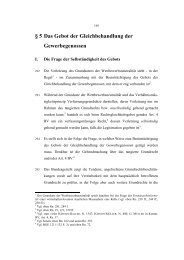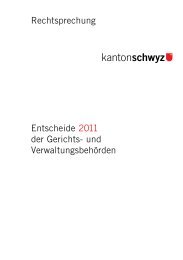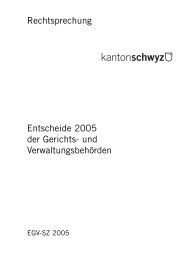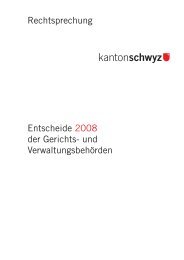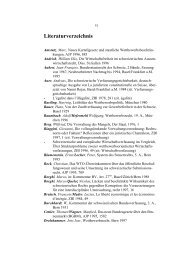EGV-SZ 2001 - Kanton Schwyz
EGV-SZ 2001 - Kanton Schwyz
EGV-SZ 2001 - Kanton Schwyz
- Keine Tags gefunden...
Sie wollen auch ein ePaper? Erhöhen Sie die Reichweite Ihrer Titel.
YUMPU macht aus Druck-PDFs automatisch weboptimierte ePaper, die Google liebt.
A. 5.1<br />
The Court notes at the outset that it has not been claimed that, contrary<br />
to Article 5 § 3 of the Convention, the Investigating Office of the Canton<br />
of <strong>Schwyz</strong>, which ordered the applicant’s detention on remand, was entitled<br />
to intervene in the subsequent criminal proceedings as a representative<br />
of the prosecuting authority (see the Huber case cited above.) In<br />
any event, according to Section 37 § 1 of the Judicial Organisation Act<br />
of the Canton of <strong>Schwyz</strong>, it is the Public Prosecutor’s Office which will<br />
raise the charges at the trial before the court.<br />
Rather, the applicant complains that during the investigations the Public<br />
Prosecutor’s Office of the Canton of <strong>Schwyz</strong> may interfere with the<br />
functions of the Investigating Office.<br />
According to the Court’s case-law, the “officer authorised by law to<br />
exercise judicial power” within the meaning of Article 5 § 3 of the Convention<br />
is not identical with the “judge” stated in that provision, and may<br />
indeed be competent to carry out other duties, in addition to deciding on<br />
detention. Nevertheless, this office must satisfy certain conditions, inter<br />
alia, as to the independence of the executive (see the Schiesser v. Switzerland<br />
judgment of 4 December 1979, Series A no. 34, pp. 13–14, § 31;<br />
the Brincat v. Italy judgment of 26 November 1992, Series A no. 249-A,<br />
p. 11, § 20).<br />
In the present case the Court notes that status and functions of the Investigating<br />
Office are laid down in detail, on the one hand, in the Code of<br />
Criminal Procedure which in Section 26 lists the grounds for detention on<br />
remand and in Section 27 provides, inter alia, that the investigating judge<br />
shall be competent to impose such detention. On the other hand, the Judicial<br />
Organisation Act of the Canton of <strong>Schwyz</strong> provides in § 42 that the<br />
Government of the Canton of <strong>Schwyz</strong> shall elect the investigating judges,<br />
and in Section 45 that the Public Prosecutor’s Office will supervise the Investigating<br />
Office. Section 44 § 2 states that the Investigating Office shall<br />
be competent for conducting the investigations.<br />
In the Court’s opinion, these provisions demonstrate that, as in the<br />
Schiesser case cited above, while the Public Prosecutor’s Office may issue<br />
directives and undertake a general supervision, the Investigating Office<br />
will decide independently in a particular case when imposing detention on<br />
remand. Indeed, in the present case the applicant was brought before the<br />
investigating judge within one day, and there is no indication that the Investigating<br />
Office obtained instructions in respect of the imposition of his<br />
detention on remand.<br />
This complaint is manifestly ill-founded within the meaning of Article 35<br />
§ 3 of the Convention and must be rejected under Article 35 § 4 of the<br />
Convention.<br />
23



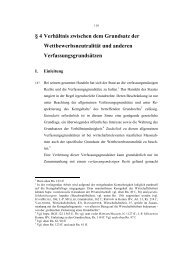
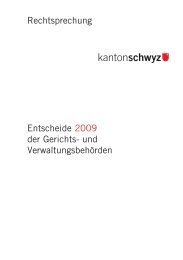
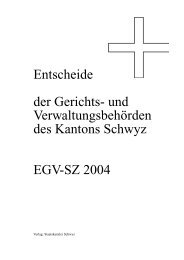
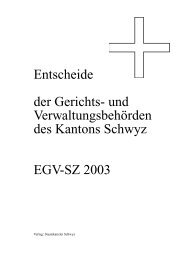
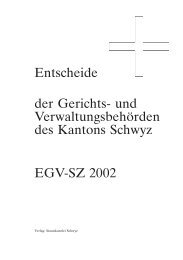
![EGV-SZ 2006 [PDF, 2.00 MB] - Kanton Schwyz](https://img.yumpu.com/33011693/1/184x260/egv-sz-2006-pdf-200-mb-kanton-schwyz.jpg?quality=85)

